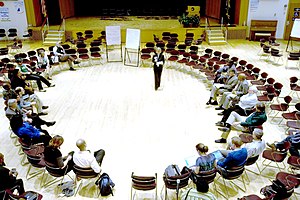Open Spaces Unconferences
This page, originally prepared for the Java Specialists Symposium in Crete, presents the essence of what an open spaces unconference is. The aim is to let attendees know what to expect.
In essence, the event will be as great as we make it.
- Whoever shows up are the right people
- Whatever happens is the only thing that could have
- Whenever it starts is the right time
- When it's over, it's over.
Be prepared to be surprised! :-)
Engage with the process.
Pre-event Open Spaces Wiki
Although not standard practice, some events may use a wiki-based pre-event topic list for asynchronous practice (a wiki-based open space :-).
Examples:
- Iced Tea in Crete - topics
- 2011 and discussion.
- ...
Some topics may be sufficiently similar to merge, or become unwieldy and be split.
As topics consolidate, post them on a schedule and invite people to "sign up". Whoever posted the topic is the "convener" who might like to lead the discussion, though groups may self-organise and optionally assign various roles (e.g. scribe, rapporteur, ...) to ensure required/desired outputs are produced.
Schedule examples:
The wiki gives some idea of the topics of most interest to the participants.
During the Event
During the event, everything may change as participants collectively decide what will happen via a face-to-face process similar to the above, perhaps using post-its, white boards and flipcharts. Topics suggested in any pre-event exercise might re-emerge but expect new ideas as the collective creative energy flows.
One approach is to have each proposer do a 2 minute pitch for their topic to attract participants (try "speed geeking"), or do a simple sign-up approach with hands/feet.
Speaking of feet, Open Spaces has one "law":
The Law of Two Feet:
"If at any time you find yourself in any situation where you are neither learning nor contributing: use your two feet and go someplace else".
i.e. don't waste time, move around, cross-pollinate groups, and be open to chance encounters which often bring out the most creative of discussions.
If you want to go to two discussions in the same time slot, try negotiating a change to the schedule (preferably during its composition).
The schedule may include opportunities for people to report back on their discussions.
Concrete Outputs?
Open spaces are open spaces with no pre-set agendas, tracks, outputs or outcomes. The participants self-organise and
- take responsibility to raise issues of concern
- discuss issues to the full extent desired
- produce reports (on-the-fly) - e.g. on a wiki (like this one :-)
- feel free to record (photo, audio, video) and post to or link from this wiki, blog, tweet, etc.
- all contributions to this wiki are licensed Attribution-ShareAlike 3.0 (Unported CC BY-SA 3.0) - see WikiEducator's copyright notice.
- typically the facilitators will help facilitate this happening but the responsibility for doing it lies with each group.
- feel free to record (photo, audio, video) and post to or link from this wiki, blog, tweet, etc.
- and, where applicable and desired, create spaces for setting priorities and developing action plans (if applicable).
Further Information
For more background see the following and associated links:
- Wikipedia on Open Space Technology.
- Owen, Harrison (2008). Open Space Technology: A User's Guide (3rd ed.). Berrett-Koehler. ISBN 978-1576754764.
- Some great videos and other resources may be found on the web.
